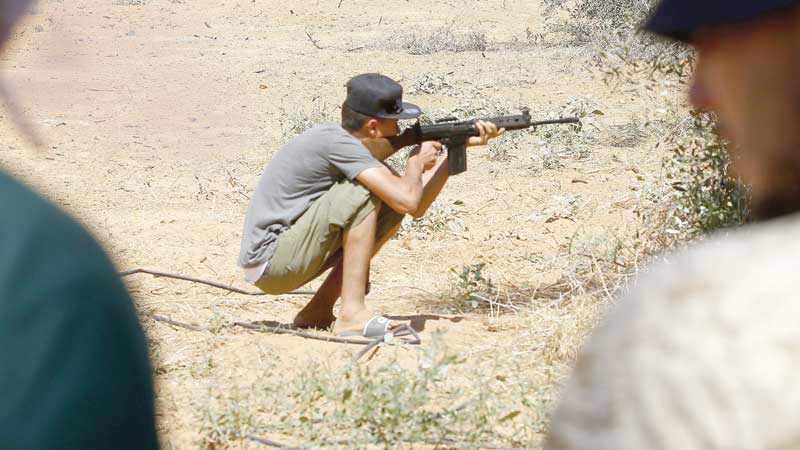

Ashraf Azabi -
As Libya’s rival delegations try to pave the way for national elections, there are worrying signs of a political struggle among Tripoli’s ruling class that could scupper efforts to unite the country.
A new and unified transitional government is to be chosen in the coming week, and is intended to lead the country — under the watchful eye of the United Nations — until elections scheduled for December 24.
The elections aim to end a division that has lasted for more than five years with two rival administrations — and their affiliated militia groups — ruling different parts of the North African country.
The government that arises out of the poll will include a three-member Presidency Council and a prime minister.
With these posts in mind, the spotlight has turned to three of the most prominent figures in the capital Tripoli, who were once allied against their administration’s main rival, military strongman Khalifa Haftar.
The three are members of the UN-backed Government of National Accord (GNA): Prime Minister Fayez Serraj, his deputy Ahmed Maitiq and Interior Minister Fathi Bashagha.
Tensions began in August when Serraj launched an investigation against Bashagha after militias opened fire at protesters. “This is when Serraj realised he was in danger,” said Farag Dardour, a political analyst and professor at Tripoli University.
“When Bashagha was summoned for investigation, he brought with him a convoy of about 500 vehicles in flagrant defiance [to show] the readiness of that force to intervene if he was dismissed. So, a settlement was reached and he retained his post,” Dardour said.
Then, Serraj said he will hand over power by the end of October 2020, which was supposed to mark the end of political talks by choosing a new presidential council and premier. As dialogue slowed down, Serraj backed down. Since then, he took some decisions that observers say are meant to protect his power.
In December, Serraj restructured the prominent Special Deterrence Forces, making it directly affiliated to him rather than the Interior Ministry.
A month later, he created the Stability Support Apparatus with broad powers, and assigned Abdul-Ghani al Kikli, a militia group leader, to head it with three deputies. The four men are not part of Bashagha’s loyalist groups. — dpa
Dardour says these moves are to counter Bashagha’s internal influence as well as contacts with foreign powers.
Bashagha visited France and Egypt in November, which reportedly made Turkey, a key military supporter of the GNA, uncomfortable.
Cairo and Paris are seen as backers of Haftar, who leads the self-styled Libyan National Forces based in Benghazi.
Bashagha’s “ambition prevailed over his position... and he used his job for self-promotion,” Dardour adds.
On the other side, political analyst Ahmed al Rowayati sees Bashagha’s travels as reflection of his “openness and courage” and believes they will increase his chances of becoming prime minister.
Al Rowayati, based in Bashagha’s birthplace Misrata, finds Serraj’s security moves as “a manoeuvre” to undermine the UN’s political work and an attempt to make himself influential politically and militarily.
The rivalry between Serraj and his deputy Maitiq seems less intense. Al Rowayati believes they have common plans and goals but each has his own plan B as well.
“Since they are in power, working on retaining it is easier than competing for nominations and quotas, which is why both of them would favour obstructing the UN process,” Al Rowayati says.
In Libya, even getting to the stage of voting for a new transitional government is a step forward, but divisions in the country put the whole process at risk. Besides the struggle for power inside the GNA, supporters of Tobruk-based and Haftar-allied parliament speaker, Akila Saleh, believe he should lead the Presidency Council.
Some believe having Saleh and Bashagha leading the new authority would please external powers on both sides of the conflict, due to Bashagha’s previous close ties with Turkey and his talks with Egypt and France.
Yet, Tripoli-based analyst Dardour believes Bashagha’s connection with the Justice and Construction Party, a religious political party, would not lead to the long-sought stability the country needs.
Haftar-backers Egypt and others are known for their fierce opposition for religious groups.
This is why other observers find that it is better if Haftar teamed up with Maitiq, who also enjoys good relations with Haftar’s backers,especially Russia. Al Rowayati believes that the recent developments in the UN-brokered talks - which began with a nationwide ceasefire agreement in October - reflect great advances.
If the process halts or fails, he says, it would lead to “chaos and political strife” but not necessarily to a new conflict on the ground. Al Rowayati argues that external powers supporting the warring parties, most prominently Russia and Turkey, do not want a war. “They have made some achievements and any military action would put these at risk,” he said. — dpa
Oman Observer is now on the WhatsApp channel. Click here



